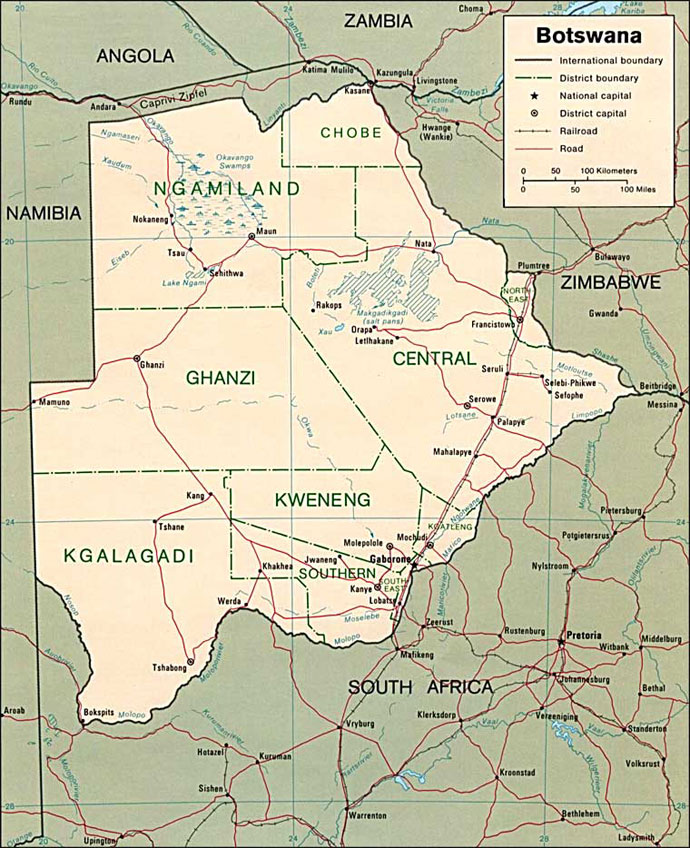
REPUBLIC OF BOTSWANA
The Semi-nomadic San people were Botswana’s earliest inhabitants. Bantu speaking tribes from the north moved into the area before the first millennium. And European missionaries arrived in the mid 19 th century.
In 1885, to counter Boer expansion from South africa and Ndebele incursions from the north led by Mzilikazi, Botswana came under British protection. By 1895, Rhodes’ British South Africa Company hoped to annex Botswana, prompting three Botswana chiefs to persuade Queen Victoria to keep her land under British control. The British administered the Bechaunaland protectorate until 1966 when it granted Botswana full independence under the leadership of Sir Seretse Khama.
Diamonds were discovered in 1967, which brought rapid growth to Botswana. In modern times, the country boasts healthy foreign reserves and is considered one Africa’s economics success stories.
SIZE
581 730 km, nearly 17% of which is protected wildlife area.
Major Cities
Gaborone (capital city), Francistown, Molepolole, Selebi-Phikwe, Maun, Serowe, Kanye
Climate
Summer : November to March. High temperatures, average 30 0 C to 350C (86 F to 95F) with lows around 180(65F) and rain showers.
Winter : June to August.Daytime temperatures around 230C(75F) with night-time lows averaging 50C (41F).
Population
2.3 million (est. 2019)
Ethnic Groups
Tswana (or Setswana) 79%, Kalanga 11%, Basarwa 3%, other 7% (incl Kgalagadi and people of European ancestry)
Government
Botswana is multi-party Democracy.
The Unicameral Parliament consists of the National Assembly (63 seats; 57 members directly elected in single-seat constituencies by simple majority vote, 4 nominated by the president and indirectly elected by simple majority vote by the rest of the National Assembly, and 2 ex-officio members - the President and Attorney General; elected members serve 5-year terms).
The House of Chiefs (Ntlo ya Dikgosi), an advisory body to the National Assembly, consists of 35 members - 8 hereditary chiefs from Botswana's principal Tribes, 22 indirectly elected by the chiefs, and 5 appointed by the President.
The House of Chiefs consults on issues including powers of Chiefs, customary courts, customary law, tribal property, and constitutional amendments.
Botswana has been governed since Independence by the Botswana Democratic Party and is headed by President HE Dr. Mokgweetse Eric Keabetswe MASISI and Vice President HE Mr. Slumber TSOGWANE.
Exports
Diamond, Vehicles, Copper, Nickel, Beef, Textiles
Currency
Pula and Thebe (One Pula = 100 Thebe). USD 1 = BWP 11.30 (est). BWP 1 = INR 6.30 (est).
Visas and Passports
All visitors must have a valid passport for at least six months, and the means to leave the country, i.e., an outgoing ticket and sufficient funds. Some nationals of commonwealth countries require visas to enter Botswana. Citizens of European community countries, Scandinavia, USA and South Africa do not require visas. Visitors will be given one month visas at the border. Extensions may be granted at the immigration office in Botswana, but visitors will not be allowed to stay more than 90 days without a residence permit application waiver.
Duty – Free Allowance
The following goods, declared on arrival, are duty free for 18 years or older passengers:
Two litres of wine
one litre spirits and other alcoholic beverages
200 cigarettes
20 cigars
250 gm cigarette and pipe tobacco
250 milliliters of eau de toilette
50 milliliters of perfume
Setswana Greetings
Hello – Dumela, rra / mma. (it is polite to add sir, ‘rra’, or madam, ‘mma’, after the greeting)
How are you ? – O tsogile jang ? (formal)
How are you ? – Le kae (informal)
I am fine and how are you ? – ke tsogile sentle, mma / rra, wena o tsogile jang(formal)
I am fine and how are you ? –Re teng, mma/rra, wena o kae?(informal)





















